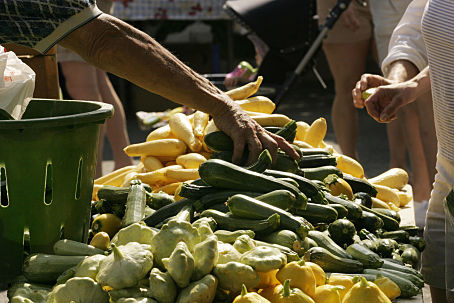Program pioneered in Takoma Park takes hold in recession-ravaged Michigan
February 10, 2011
Source: Washington Post
Author: Tim Carman

A program that first sprouted at the Crossroads Farmers Market in Takoma Park in 2004 has firmly taken root in Michigan, where healthful-food advocates will launch a statewide effort this spring to double the Supplemental Nutrition Assistance Program benefits used at farmers markets.
The goal, say organizers, is to give low-income families access to locally produced fruits and vegetables in a state where unemployment remains a good two points above the national rate and where the economy has sputtered along for a decade without any economic growth. According to the Fair Food Network in Ann Arbor, 1.75 million people in Michigan receive SNAP benefits, which is 17.5 percent of the state’s population, compared with the national average of 12.9 percent. Michigan’s SNAP recipients have increased by 50 percent since October 2008.
Under Fair Food Network’s Double Up Food Bucks program, many of those residents will be able to take advantage of farmers markets this spring in Detroit, Battle Creek, Detroit, Ypsilanti, Ann Arbor, Flint, Grand Rapids, Kalamazoo, Lansing, Saginaw and Traverse City, where their SNAP benefits will be doubled for up to $20 per visit.
Linda Jo Doctor, program officer with the W.K. Kellogg Foundation, one of the major funders of Double Up Food Bucks, notes that this is the first time such a program has been expanded statewide. Fair Food Network had been testing its double-SNAP benefits at various markets before securing the funding to take the project across Michigan.
To Doctor, Double Up Food Bucks is a win-win for Michigan: It should attract more customers to the state’s farmers, which could help stimulate the rural economy, and it should give low-income families access to fresh produce, which could help lower obesity rates. Michigan ranks No. 10 in the country in obesity with 29.4 percent of its population deemed overweight. The Double Up Food Bucks are only good to purchase fresh fruits and vegetables, which could be a sticking point for some low-income advocates.
By contrast, the FreshFarm Market organization in the District of Columbia and Maryland, which administers a similar SNAP program at several of its markets, allows recipients to purchase any product available, whether it is milk or meat or fruits and vegetables. FreshFarm co-founder Bernadine Prince has no issue with Fair Food Network’s approach to limiting consumer choices, noting that it makes sense to try to direct dietary choices when there are so many negative consequences to widespread obesity.
FreshFarm’s own Double Dollars program for SNAP beneficiaries has expanded since it launched at two markets in 2008. Last year, five markets, including those near the White House and in Silver Spring, accepted Double Dollars. But Prince says FreshFarm may drop its Annapolis market from the program. In its place, she’d like to introduce the Dupont Circle market into the fold.
"That’s our flagship market," Prince says, "and it makes sense to try to do that.”
The main hurdle to including Dupont is monetary. Pulling together these SNAP programs at farmers markets requires serious cash, both in terms of the money needed to reimburse farmers for their products and in the personnel necessary to run the operation. "For every dollar we give away, we have to spend a dollar in administrative costs," Prince says. "It’s not a cheap program."
If the expansion of these SNAP programs validates their importance and popularity with all parties, then that comes as a small surprise to David Hochheimer, co-owner of Black Rock Orchard in Lineboro, Md. His wife, Emily Zaas, hauled Black Rock fruits to that pioneering Crossroads Farmers Market in 2004, when market founders John Hyde and Michelle Thornet decided to introduce the food-stamp program.
Back then, Hochheimer says, the program just didn’t generate enough extra business for Black Rock to remain a part of it. The farmers left the following year.
But the organizers of the Double Up Food Bucks in Michigan have high hopes. The Kellogg Foundation’s Doctor says everyone will be monitoring the program closely this year and beyond. If it proves successful, she wouldn’t be surprised to see it expand to other states.
Maybe even across the nation.
This article was originally published by the Washington Post 2/9/2011







